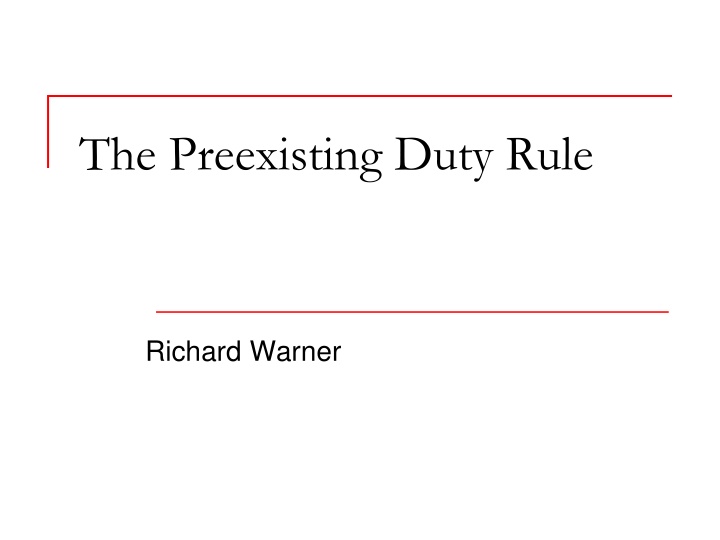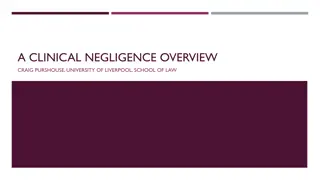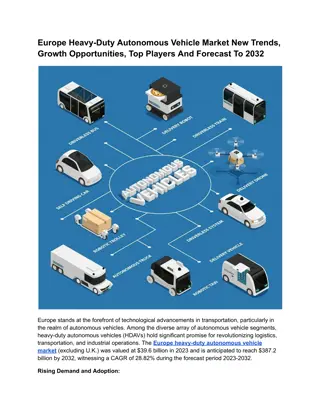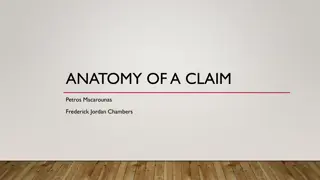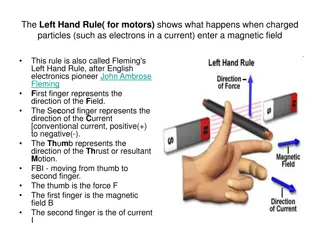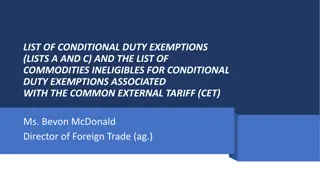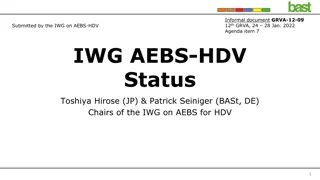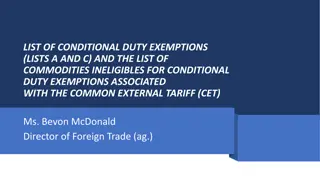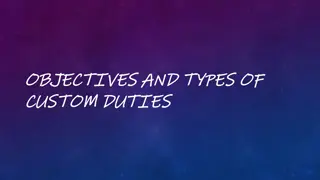The Preexisting Duty Rule
Concept of legal consideration in contract law is essential for determining the enforceability of promises. The preexisting duty rule, bargain theory, and public policy considerations play key roles in analyzing contractual obligations and exceptions.
Download Presentation

Please find below an Image/Link to download the presentation.
The content on the website is provided AS IS for your information and personal use only. It may not be sold, licensed, or shared on other websites without obtaining consent from the author.If you encounter any issues during the download, it is possible that the publisher has removed the file from their server.
You are allowed to download the files provided on this website for personal or commercial use, subject to the condition that they are used lawfully. All files are the property of their respective owners.
The content on the website is provided AS IS for your information and personal use only. It may not be sold, licensed, or shared on other websites without obtaining consent from the author.
E N D
Presentation Transcript
The Preexisting Duty Rule Richard Warner
The Preexisting Duty Rule The rule: a promise or performance cannot be consideration if the promisee is already legally bound to do as he or she promises or performs. This would seem to make sense in terms of the bargain theory: how can one be seriously bargaining for what the other is already required to do?
Bargain Theory Did the promisor make the promise in order to get a promise or performance in return? Yes No Did the promisee provide an explicit or implicit promise or performance in return? Yes Promissory estoppel? No Yes No Enforceable Moral obligation or other exception? Either no pre-existing duty, or an exception to the pre-existing duty rule? Yes No consideration No Yes No Too private? Yes No consideration Enforceable Unenforceable No Unenforceable There is consideration
The Greedy Life Guard Mary is drowning. The pool lifeguard, who is hired and paid by the facility and is on-duty, tells Mary's family that they must pay $50 for him to save Mary. The family promises to pay the money. Is there consideration for the family s promise? a) Yes b) No
Gray v. Martino What was the promise? Martino promised to pay police officer Gray-- $500 if he found he thieves that had robbed her. He did, but Martino refused to pay. What was the alleged consideration? Martino s finding the thieves. (Why not a promise find them?) Put consideration aside for the moment. If you were a legislator, would you allow such promises to be enforceable? Good reasons not to: Police might slight other cases refuse to work unless victims promised to pay extra. `
Pre-Existing Duty In Gray v. Martino Martino promised to pay police officer Gray $500 if he found he thieves that had robbed her. The alleged consideration is Gray s finding the thieves. But Gray is already legally obligated to find the thieves. So his finding the thieves cannot serve as consideration.
Public Policy A court could refuse to enforce the promise on ground that we do not want to encourage bribery. There is an applicable doctrine: "Promises that violate public policy are not enforceable". Usually applied to promises that involving illegal activity: Like gambling debts where gambling illegal.
Sarah, Ted, and Tillie Sarah has been hospitalized with an eating disorder. Her favorite Aunt Tillie and Uncle Ted are visiting her in the hospital. Ted promises to pay her $1000 dollars if Sarah promises to follow her therapist s and nutritionist s eating plan. Sarah so promises. Aunt Tillie promises to pay another $100 for each pound she gains. Sarah already promised Uncle Ted to follow her therapist s and nutritionist s eating plan, and if she does that, she will gain weight. Is Aunt Tille s promise unenforceable under the pre- existing duty rule? (a) Yes. (b) No.
Sarah, Ted, and Tillie Again Ted: Ted promises to pay her $1000 dollars if Sarah promises to follow her therapist s and nutritionist s eating plan. Sarah so promises. Tillie: Tillie promises to pay $100 for each pound she gains. Dorothy: Dorothy promises to pay $100 for each pound she gains if she follows the nutritionist s eating plan. Is Dorothy s promise unenforceable under the pre- existing duty rule? (a) Yes. (b) No.
De Cicco v. Schweitzer Who is trying to get out of promise? The father; her promised to pay $2500 if daughter married the Count. They married, then later the father refused to pay. The plaintiff is Attilio DeCicco. Probable facts: the father promised to pay over several years; the couple sold the note to a moneylender, DeCicco; the father did not want to pay DeCicco; DeCicco had all rights of the couple since he bought the note. At the time an engagement was legally enforceable promise to marry. So the fathers promise to pay the money in exchange for the couple s getting married was a promise to get them to do what the couple was already legally bound to do. So there would seem to be a pre-existing duty rule problem here with the enforceability of the father s promise.
The Argument in DeCicco 1. In any contract, the parties to the contract can rescind the contract by mutual agreement. 2. So the couple could rescind their engagement contract. 3. So the couple is not legally bound to get married. 4. So the father s promise is a promise to the couple to get them to agree not to do something they have a legal right to do: rescind the engagement by mutual agreement. 5. So the pre-existing duty rule does not prevent couple s promise from serving as consideration for the father s promise.
Rescission I agree to rescind this agreement. I agree to rescind this agreement. Contract
Rescission Loophole Was the duty to get married absolutely binding? No, parties to a contract can agree to call off contract. Result: when they did not exercise that right they went beyond any pre-existing duty. So there was consideration.
Lingenfelder v. Wainwright The brewery hired an architect. Midway through the job, the architect, who was also president of a refrigeration company, got mad because he did not get the refrigeration contract. So he walked off the job. The brewery need to finish building, so it to pay him more money to finish job. The court held that the modified contract was unenforceable under the pre-existing duty rule.
Lingenfelder v. Wainwright Second document, Is the promise to pay more enforceable? First document, enforceable promise Pay Pay more Build Build What is the purported consideration for this promise?
Problem: Rescission in Martino In Martino why can't the officer say, "True I had a duty to find the thieves but only so long as I was a police officer; I also had the right to rescind my employment as a police officer; I could have quit, retired." So when the police officer stayed on the job he was giving up something he had a legal right to do. So this is just like the engaged couple case. So is there consideration after all? Problem: very few legal duties are absolute. Usually there is a way to get released.
Counterproductive doctrinal changes The problem occurs constantly: argument developed to justify decision in one type of case turns out to apply to other sorts of cases--where we really do not want it to apply. Consider Wood v. Lucy and Dougherty v. Salt: implied promise in one, why not the other? Like trying to flatten out a piece of warped metal--push it down in one place, pops up in another.
History of the pre-existing duty rule To see the history, first consider this variation Lingenfelder Suppose the brewery turns out to be harder to build than expected; ground turns out to be softer than thought. It will cost a lot more than architect thought to finish job. Normally, brewery can demand that architect finish job at contract price. (But not always: not if the job is very much more difficult, but don't worry about that.) Imagine that the brewery voluntarily offers to pay architect more (for good will, reputation, relationship to architect, sense of fairness). Both parties agree on additional payment. This looks like a promise courts should enforce (commitment signaled through an exchange of promises in order to coordinate actions for the parties mutual benefit). But what about pre-existing duty rule? This time the rule prevents enforcement of legitimate modifications of contracts.
An Emerging Pattern Courts for a while did refuse to enforce such contracts. They came under a lot of criticism for this. Some courts responded by counting token (or nominal) consideration as sufficient for consideration. Token consideration is a promise or performance so trivial that the promisor could not be giving his or her promise to get the token promise or performance in return; think of Schell v. Nell.
Token (Nominal) Consideration There is a way to make legitimate modifications enforceable. What about token consideration? For building plus one cent I promise to pay 5% more; or for building plus moving window one inch--architect does not have pre-existing duty to build building that way. Is this sufficient for consideration? Some courts started counting token consideration (same pattern in requirements contracts). Problem: then why isn't token consideration adequate in cases like Schnell v. Nell? Solve one problem, have another. Another problem: what if token consideration had been demanded and given in Lingenfelder? Are we then going to enforce extortionate contracts? So counting tokens as consideration is perhaps not the greatest idea.
Rescission Loophole There is another strategy--suggested by DeCicco. Suppose parties in the legitimate case tear up old contract; they can do that, parties can call off the contract. They then make new contract just like old one except 5% more to architect. Once old contract is rescinded, there is no pre-existing duty, so new the contract is binding. This was frequently used to make modifications. See Schwartzreich case. Some courts even held that you don't have to tear up old contract or do anything physical to it; the court can find that parties implicitly rescinded old contract. Problem: the technique can be used in extortionate contract cases.
The Pattern That Emerged If modification looked voluntary, courts found rescission or counted token duties as consideration. If it looked like extortion, they would not find rescission or count token duties.
The Pattern Prior to the Modern Law Pre-existing duty rule problem no mention of the rescission loophole or token consideration No good faith, no commercial reasonableness reasonableness No good faith, no commercial Good faith and commercial reasonableness No pre-existing duty rule problem invoke the rescission loophole or find token consideration First contract Modified document First contract Modified document
Modern Law UCC 2-209 A modification of a contract is binding without consideration. Official comment: the modification must be sought in good faith and for commercially reasonable purposes. Restatement (Second) Contracts, Section 89. A modification of a contract is binding if the modification is fair and equitable in view of circumstances not anticipated by the parties when the contract was made. In addition, according the Restatement 89, the contract must not have been fully performed by either side.
Does Not Apply To Contract Modification The preexisting duty rule does NOT apply to contract modification.
Alpine Manor Alpine Manor Banquets contracted with Tony s Tomatoes for 100 pounds of tomatoes at $1.50 a pound. Shortly after, the market price of tomatoes dropped considerably. Alpine asked Tony to modify their contract to reduce the price to $1 per pound. Tony says, You agreed to $1.50 a pound. That is our deal. If you pay me only $1 a pound, maybe I will decide not to sue you because you are a good customer. (a) Alpine and Tony modified their original contract. (b) If Alpine pays Tony only $1 a pound that is a breach of their contract. (c) Both (a) and (b).
Preexisting Duty Rule Did the promissor make the promise in order to get a promise or performance in return? Yes No Did the promisee provide a return promise or performance? No preexisting duty rule issue No Yes Was the promisee already legally bound to so perform or to keep the promise? No preexisting duty rule issue No Yes Exception to the preexisting duty rule? No preexisting duty rule issue No Yes The preexisting duty rule does not make the promise unenforceable Unenforceable
Careless Collectors Expansion City contracts with Careless Collectors to collect its garbage. Collectors agrees to collect the garbage for five years; and Expansion agrees to pay $500,000 a year to Collectors. Expansion City doubles it size in two years after the signing of the contract. At the beginning of the third year of the contract, Careless Collectors refuses to collect the garbage and demands more money. Collectors points out that it now costs it over $500,000 a year to collect the garbage, so they are losing money. When negotiating the original contract, Expansion City had supplied Careless Collectors with growth studies that indicated that Expansion would double its size in two to five years. Collectors did not take these predictions into account when setting the $500,000 a year contract price. With the garbage piling up and constituting a health hazard and with no other company to turn to other than Collectors, Expansion agrees to a new contract with Collectors for $700,000 a year. Is the new contract enforceable? (a) Yes (b) No
